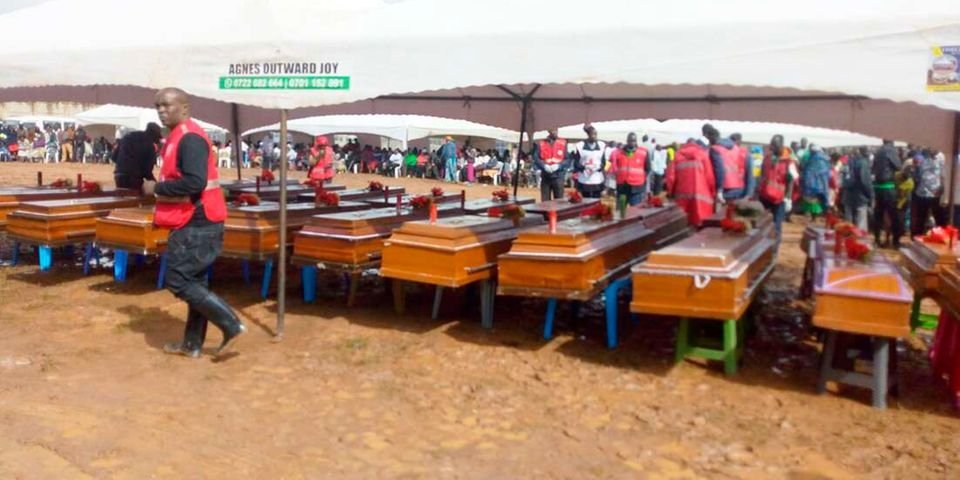Traditionally, just like in many African societies, death is a subject discussed in hushed tones among the Pokot.
When it came to burying their dead, a few considerations were made.
From the status of the person to the time of death, all these variables would influence how a body was interred.
The most senior member of the society would receive a sendoff befitting their status, but some would be left in open fields.
Most warriors killed during cattle raids or other battles were left to rot in the bushes, where they fell.
According to Pokot elders, if a warrior dies at war, no tears are shed.
A burial site will not be prepared. No grave will be dug and there is no burial. When a warrior died in war, he was left in the bush, where vultures and hyenas feasted on the body.
Taboo
However, these practices are slowly changing as people embrace modern-day burials and graves.
What has not changed, however, is their view of death.
Here, the making, displaying and selling of coffins by business people is prohibited. This, according to Pokot elders, is a curse and therefore a taboo.
However, a few carpenters, keen to make some income and bold enough to risk the sanctions of the ‘curse’, make coffins secretly.
While death is inevitable, carpenters with workshops in Kapenguria and Makutano do not make or display coffins, as this is viewed as a bad omen.
Coffins are usually being made only on order and given to the buyer within an hour or two. It is never displayed. Also, there are no ready-made coffins.
William Lopetakou, an elder who is the community’s culture man, said that during the colonial era, village elders imposed a ban on making coffins in the area to ward off the “spirit of death”.
“When a person dies in the Pokot community he becomes useless. It is a ban inherited from one generation to another and this forces families and friends to travel from West Pokot to Kitale in Trans Nzoia County or other major towns to buy coffins when their relatives die,” he said.
In 2019, for instance, when more than 60 people died in a landslide that wiped out parts of Chesegon, Parua and Tamkal villages, coffins had to be bought from Kitale.
Mr Lopetakou said making coffins was viewed as one way of welcoming death.
“We can’t accept such business. We have all other kinds of businesses, but selling coffins is totally forbidden,” he said, adding that they believe so much in their culture and they can’t allow anyone to go against it.
God exists
He noted that when a person dies and there is no coffin nearby, the body is usually wrapped in a blanket and buried.
“We give a befitting sendoff for the deceased in our unique way. The elders and pastors pray for the dead and we believe God exists,” he said.
He argues that elders play a critical role in making sure good manners are instilled among residents.
“Just seeing a coffin on display instils a lot of fear among locals. Carpenters don’t have the courage to make coffins and put them on display,” he said.

Mr Lopetakou noted that according to African traditions, death is a rite of passage to another existence, a transition that does not change or alter the life or temperament of a person but only causes a change in its form.
“Individuals who have died become ancestors and continue to ‘live’ in the community and to commune with their families. In most African communities, if proper burial rights were not performed it was believed that the deceased may become a wandering ghost, unable to exist in a stable manner after their death,” he said.
Pokot council of elders chairperson John Muok noted that in other counties coffin businesses are booming but in West Pokot, if someone opens such a business it will be closed.
“There were no coffins in ancient days. People used to be buried without a coffin. We have no problem with other tribes making coffins, but I am sure they will feel odd and end up stopping that business,” he said.
He added that a few years ago a carpenter opened a coffin shop near Kapenguria County Hospital but the business closed down.
“People went to buy coffins but found it closed. His instincts might have driven him to close it after realising he was the only person in the entire county with such a business,” he said.
Mr Muok said in Pokot traditions and beliefs elders do not permit burial items to be displayed openly.
Ayubu Khamala, who owns a workshop in Makutano, noted that he only makes coffins on request but cannot display them outside his workshop.
“If you attempt to open a workshop to sell coffins, the elders will be on your case and close your business. It’s taboo to sell coffins within the county. Most carpenters from outside the county were shocked when they found things being done differently here,” Mr Khamala said.
John Pkieh, another carpenter, noted that the community perceives the sale of coffins as a business that can enrich someone simply because the more coffins on display, the more deaths they attract.
Credit: Source link